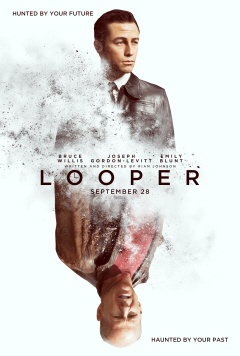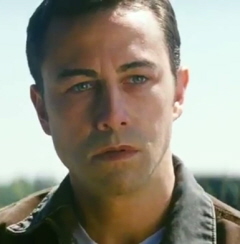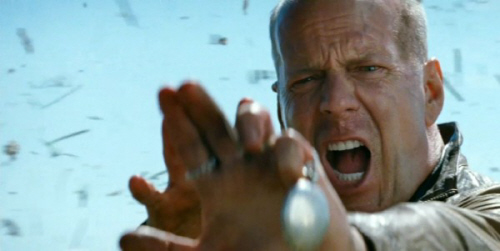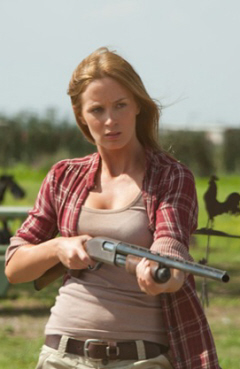 In gearing up for my review of Rian Johnson’s Looper, I kept searching to find a definitive train of thought that’d illustrate what makes the film so special. Whenever I’d arrive at a conclusion I’d be visited by another observation that’d completely morph or enhance my perception of the film. Complex, oscillating and categorically immersive, Johnson has unleashed a filmic vision that’s as rewarding as it is emotionally resonate. Looper is an all-timer – a film that, years from now, emerging young filmmakers will credit as one of the works that inspired them to hone their craft.
In gearing up for my review of Rian Johnson’s Looper, I kept searching to find a definitive train of thought that’d illustrate what makes the film so special. Whenever I’d arrive at a conclusion I’d be visited by another observation that’d completely morph or enhance my perception of the film. Complex, oscillating and categorically immersive, Johnson has unleashed a filmic vision that’s as rewarding as it is emotionally resonate. Looper is an all-timer – a film that, years from now, emerging young filmmakers will credit as one of the works that inspired them to hone their craft.
Speaking strictly from a science-fiction standpoint, Johnson raises the bar. He accomplishes what only the finest of storytellers are capable of: he creates reality. One that feels troublingly askew yet wholly true to our own. Looper, with a bullet, now stands side by side works like Blade Runner, Star Wars and 2001 – visionary science-fiction tales by artists working at the height of their crafts. That it might even reach further than one or two of the above-mentioned works is a debate that can only be answered in time.
And time is exactly what this film is about. The moments that change and shape us – often proving to be our undoing long before we’ve realized. What would you risk to save a single moment in time? A nurturing glance from his lover, a memory tapering away like an echo, lies at the heart of Old Joe’s (Bruce Willis) crusade. Memory is not an exact science, even if the feelings it generates are profound. This elder Joe is at an impasse – struggling with feelings of regret and rage in what he’s lost – his transgressions carved into his soul like personal engravings. And when the person he loves is taken away, his self-destruction becomes the world’s burden to bear. Not his world exactly, but we’re getting to that.
 Time travel hasn’t been invented in the decrepit, decaying gangland of 2044 America. That comes 30 years later. We first meet Young Joe as he’s still a fresh successful Looper in 2044. Loopers are hitmen called upon to kill people from the future that the mob, now in firm control of the US, want to dispose of. Victims are sent back where they’re immediately finished off by the blunderbuss gutshot of a waiting Looper –their bodies disposed of in the most creative, efficient way possible.
Time travel hasn’t been invented in the decrepit, decaying gangland of 2044 America. That comes 30 years later. We first meet Young Joe as he’s still a fresh successful Looper in 2044. Loopers are hitmen called upon to kill people from the future that the mob, now in firm control of the US, want to dispose of. Victims are sent back where they’re immediately finished off by the blunderbuss gutshot of a waiting Looper –their bodies disposed of in the most creative, efficient way possible.
Loopers are bestwowed with a lavish life of money, drugs and women. But it comes at a grave price. The name “Looper” is derived from closing one’s own loop – meaning that, once the mob decides it’s your time, your future self is sent back to be finished off by your younger self. As those being sent back are cloaked in a hood, Loopers often don’t know they’ve finished themselves off until after the deed’s already done.
The Joe of 2044 senses that his time’s coming close, as night after night his peers are looping themselves with increasing regularity. A mysterious crimelord from the future, known only as The Rainmaker, has decided to close all the loops. It’s a realization of ever-increasing angst that gets complicated when his elder self shows up without hood. In a moment of hesitation, Old Joe makes a run for it and Young Joe is left to track down his future self and close out the loop.
Where Johnson could have cast one actor and have him play both characters, his is not a film confined to such gimmickry. Instead, the onus falls on Joseph Gordon Levitt to inherit Bruce Willis’ mannerisms and look (with some minor assistance via makeup). And he performs his task splendidly. Once a child star in films like Angels in the Outfield, it was Johnson who reintroduced audiences to JGL with his brilliant Brick. That he’s now brought about the actor’s two finest performances is a credit to both a director and a star that have continued to impress in the early parts of what promise to be very long careers.

Levitt’s surrounded by a magnificent cast. Bruce Willis is here to play a very familiar character, this is classic Bruce. But he does so with an intensity and weariness that we only see in the films the actor truly gets up for. Willis is a performer often phoning it in, but it’s a tradeoff I accept when he appears in work like Looper. Equally impressive is Jeff Daniels as Abe, the skeezy crime lord doing the mob’s work in 2044.
 Emily Blunt delivers what I believe to be the best performance in her career as Sara, a cane farmer that Young Joe is forced to protect from his older self. To reveal why would be to giving away too much. But the most astounding performance in the film, one that’s as creepy as it is complicated, belongs to Pierce Gagnon as her son Cid. This is the most memorable child performance I can recall since Macaulay Culkin in Home Alone. It’s a weird comparison, but it’s not often that a director is able to finagle such an effecting performance from such a young actor – one that not only contributes to the film but enhances it. That Gagnon is five is astounding. More than anyone else, he is who people who’ve seen Looper will be talking about next week.
Emily Blunt delivers what I believe to be the best performance in her career as Sara, a cane farmer that Young Joe is forced to protect from his older self. To reveal why would be to giving away too much. But the most astounding performance in the film, one that’s as creepy as it is complicated, belongs to Pierce Gagnon as her son Cid. This is the most memorable child performance I can recall since Macaulay Culkin in Home Alone. It’s a weird comparison, but it’s not often that a director is able to finagle such an effecting performance from such a young actor – one that not only contributes to the film but enhances it. That Gagnon is five is astounding. More than anyone else, he is who people who’ve seen Looper will be talking about next week.
These actors all perform their best to bring Rian Johnson’s vision to life. His is a script that’s thought of everything. Just when you think there’s a hole in the boat, the writer / director seamlessly seals it shut. He not only invents the rules, he plays by them ardently as soon as they’re introduced. This is a film that doesn’t care if you have the angles figured out before it accounts for them. Johnson lets the story build on its own time and is content to leave some questions unanswered. One in particular, regarding Daniels and his antagonist protégé Kid Blue (Noah Segan), has me going back and forth about the nature of their relationship. I have to imagine I won’t be the only one.
Above all else, Looper stands as a superb character study of the highest order. It’s a film about acknowledging one’s own self destruction and facing the pain and anguish our selfishness causes to those in proximity. What Johnson manages to do is take those realizations and turn them on their ear – where typically it’s our present confronting our past, Looper presents a reality where more complex confrontations are possible. In a story that takes us from the derogated sprawl of the city to the shivering cane fields of farm territory, this is a beautifully shot work of poetry where every bar confirms what came before and enhances what’s to follow. Heady science-fiction, a next-level script and spectacular performances come together to signal the emergence of one of the great storytellers of our time, and not a moment too soon. This is one loop that should never be closed.
Rating: 




Out of a Possible 5 Stars